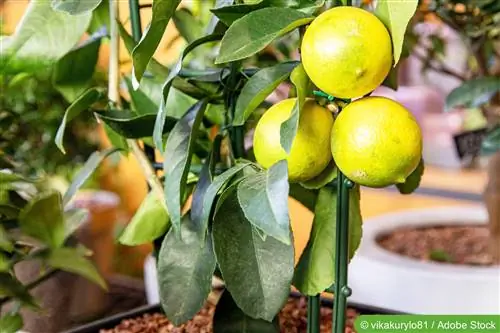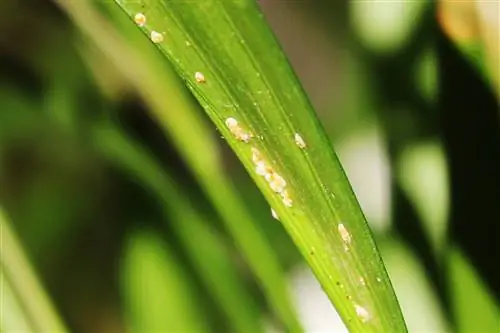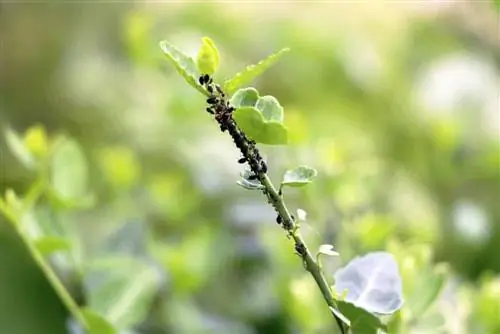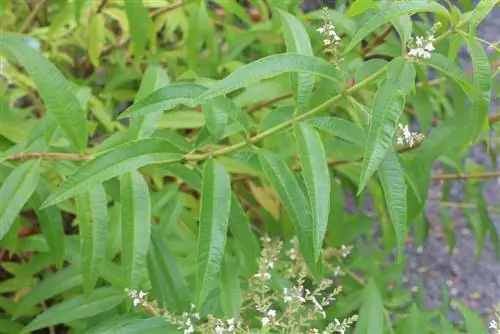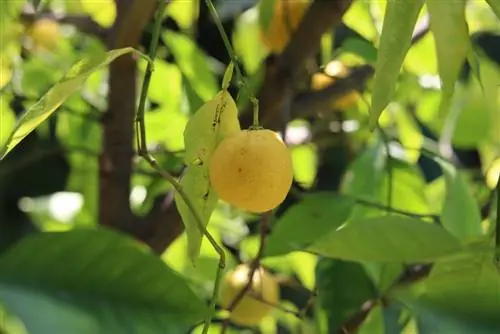- Author admin [email protected].
- Public 2023-12-17 03:39.
- Last modified 2025-01-24 12:45.
With a height of up to 4.5 m, the normal lemon tree (Citrus x limon) is too large for the apartment. That's why you should choose smaller cultivars for citrus trees. Citrus limon Meyer produces light yellow, thin-skinned fruits up to 9 cm in size. Citrus limon Ponderosa has thick-skinned, orange-yellow fruits up to 11 cm in size.
Lemon Tree Care
- Lemon trees are best planted in special soil for citrus plants.
- Repotting should be done in spring.
- The lemon tree loves a bright location, but should be protected from direct midday sun.
- If you place the lemon tree on the balcony or terrace in summer, it has a positive effect on growth and flower formation.
- The lemon tree thrives at normal room temperatures; in winter the temperature should be between 9 and 15°C.
- In spring, summer and autumn, the lemon tree should be watered moderately - the top layer of soil is allowed to dry out slightly before watering again. Fertilization should be done every 14 days.
- In winter, water only enough to prevent the soil from drying out completely. Do not fertilize.
- You can cut back the lemon tree at any time during the growth phase. This promotes bushy growth of the plant.
- Unfortunately, lemon trees are often attacked by scale insects.
Scale insects on the lemon tree
There are different types of scale insects. Scale insects are insects up to 5 mm in size, the females of which have a white to brown, round or elongated shield under which the eggs lie. They damage the plant in several ways:
- The females have a stinger through which they suck plant sap.
- At the same time, they release both secretion and fructose through this stinger. This secretion causes additional damage to the plants.
- The suction points allow fungi to enter the plant, for which fructose is a nutrient medium. These fungi also damage the plant.
A scale insect infestation is usually first recognized by a sticky coating (honeydew) on the leaves. The scale insects themselves are also clearly visible. They sit on the trunks and in branch forks as well as on the tops and undersides of leaves. Fighting a scale insect infestation is difficult and time-consuming. In any case, the affected plant must be isolated to prevent spread.
If only a few leaves are affected, you can cut them off. Burn the cut leaves or dispose of them in a closed plastic bag in the trash. The plant must subsequently be checked for the appearance of further scale insects.
If the infestation is small, scraping with alcohol can be successful. To do this, a cotton swab is soaked in high-percentage alcohol, dabbed on the scale insects and then scraped off with a knife. You have to do this very carefully because the eggs sit under the shield and can be easily spread when scraped.
Under no circumstances should you try home remedy recipes with tea tree or neem oil. Citrus plants react to this by dropping leaves.
Another option is oil-based products against sucking insects. They are offered as a spray and work by connecting the insects to the plant in an airtight manner using an oil film and thus suffocating them. This is effective. Unfortunately, this also seals the leaf pores, so that not only the scale insect but also the leaf suffocates. It is therefore better to limit spraying to the trunks and forks of branches. To treat the leaves, spray a cotton swab well and dab the scale insects with it.
As a last resort, there are so-called systemic remedies. These are substances that are absorbed by the plant through the roots, distributed throughout the plant and absorbed by the scale insect through the plant sap. They are offered as sticks or as granules. The sticks are inserted into the soil and the granules are incorporated into the soil. However, these products usually also contain fertilizer. This can easily lead to over-fertilization, especially in winter.
Moisture
Soil that is too moist causes few fruits to form. In addition, the sensitive roots can die. Soil that is too dry is also not good. The right dose is crucial. You should use low-lime, soft water. You can use special citrus plant fertilizer for fertilization.
Wintering
The lemon tree overwinters at temperatures between 5 and 10 degrees Celsius. The room must be very bright. The location should not be changed during winter rest. Watering is done very sparingly. At these low temperatures the roots stop their activities. This usually results in many leaves being dropped.
Tip:
After spending the winter indoors, the lemon tree must slowly get used to the sun, otherwise sunburn can occur.
Cutting
The best time to prune a lemon tree is spring. Fruit-bearing branches should not be trimmed. The purpose of the pruning is to prevent the tree from becoming too large and so that it bears more fruit.
Scale insects often appear on lemon trees. Mealybugs also occur. You should be very careful with chemicals, but usually nothing else helps.

